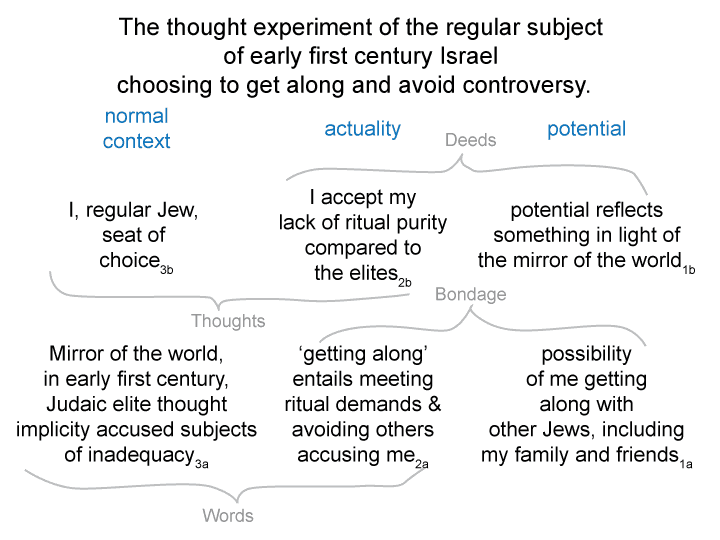Man and Sin by Piet Schoonenberg (1964) 2.3 LQ
[Since the Second Temple Law was complicated and self-contradictory, accusations could always occur (especially if one attracted attention).
This threat of accusation made it easy for common folk to choose a lack of self worth in order to avoid catastrophic accusations.]
Man and Sin by Piet Schoonenberg (1964) 2.3 LP
[The mirror of the world3a or the thought experiment3a narrows the range of ‘somethings2a’ that a person can envision1a.
The Second Temple elites always acted more ritually pure relative to the subjects.
Therefore, one particular ‘something2a’ became the best option for the common folk.
What was that something2a?
Here it is:
Get along by (trying to) meet ritual demands and, most importantly, avoid being accused of violating the Law.]
Man and Sin by Piet Schoonenberg (1964) 2.3 LN
[What might help me understand this?
I turn to the model of the thought experiment where I choose ‘something’.]
Man and Sin by Piet Schoonenberg (1964) 2.3 LM
Summary of text [comment] page 83
[Let me go back to the return from the Babylonian exile.
Why did the common folk of the second temple allow a sovereigninfra to form?
Why did they consistently support Sadducees, Pharisees and Scribes in their devotion to an objectorganization of ritual purity?]
Man and Sin by Piet Schoonenberg (1964) 2.3 LL
[The decline of the Roman Empire may have been tempered by the multiplication of less politically minded Christians.]
Man and Sin by Piet Schoonenberg (1964) 2.3 LK
[Consider histories of Franklin Roosevelt written in the 20th century (7700s U0’).
Not one assessed the economic consequences of Roosevelt’s tragic and capricious presidential leadership.
The Federal Reserve Board caused the Great Depression.
Roosevelt did nothing to stop their madness.
He enhance the Great Depression by supplementing economic with political uncertainty.
Why did America not fall into revolution?
The common folk were still Christian.]
Man and Sin by Piet Schoonenberg (1964) 2.3 LJ
[Modern intellectuals rarely correlate the political rhetoric (words) with economic consequences (bondage).
Indeed, it seems that their job is to produce the words that put the common folk into bondage.]
Man and Sin by Piet Schoonenberg (1964) 2.3 LI
[Why did modern historians believe the rhetoric of the Pagan Romans?
Traditional pagan Romans blamed Christianity for their decline.
Naive and self-absorbed modern intellectuals took their words at face value.]


